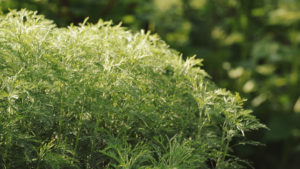Sweet Annie is a herb. The parts that grow above the ground are used to make medicine.
Contents
Uses
Sweet Annie is also used for bacterial infections such as dysentery and tuberculosis; illnesses caused by worms, other parasites, and mites; fungal infections; and viral infections such as the common cold. Other uses include treatment of upset stomach, fever, yellowed skin (jaundice), psoriasis, systemic lupus erythematosus (SLE) and other autoimmune disorders, loss of appetite, blood vessel disorders, constipation,gallbladder disorders, stomach pain, painful menstruation, and joint pain (rheumatism).
People with AIDS sometimes use sweet Annie to prevent an often fatal type of lung infection called pneumocystis pneumonia (PCP) that is caused by a fungus.
Sweet Annie is sometimes applied directly to the skin for bacterial and fungal infections, arthritis and other joint pain, bruises, nerve pain, and sprains.
Benefits
Some herbal remedies are made from the dried leaves of sweet Annie and sold as malaria treatments. However, the World Health Organization encourages people to avoid using these products to treat malaria. Instead, it recommends pharmaceutical drugs made from artemisinin and other compounds.
Antimalarial drugs that contain artemisinin usually also include another drug. People commonly use these medications in countries where malaria is common. In 2009, the U.S. Food and Drug Administration also approved Coartem for use in the United States. This is the first artemisinin-based drug approved in the United States.
More research is necessary to determine if sweet Annie is a useful treatment for cancer. Scientists continue to research sweet Annie’s effect on cancer cells. According to an article published in Trends in Pharmacological Sciences, artemisinin may be useful for treating leukemia and cancers of the:
- colon
- breast
- lung
- pancreas
It may also slow the growth of ovarian cancer cells and treat colorectal cancer. Artemisinin is generally considered safe. It probably causes fewer side effects than many other cancer treatments
Cautions
Sweet Annie is POSSIBLY SAFE for most adults when taken by mouth. The tea of sweet Annie might cause upset stomach and vomiting. It might also cause an allergic reaction in some people including a rash and cough.
There has been one report of liver damage in a person who took doses of sweet Annie that were too large. But liver damage has not been reported in people taking typical doses.
Not enough is known about the safety of applying sweet Annie directly to the skin.
Special Precautions & Warnings:
Pregnancy and breast-feeding: Sweet Annie is LIKELY UNSAFE when taken by mouth during pregnancy. Animal studies show that drugs made in the laboratory from artemisinin, a chemical found in sweet Annie, can cause death of the fetus or birth defects when used early in the pregnancy. The safety of using sweet Annie during the last 6 months of pregnancy is not known. Nevertheless, the World Health Organization considers drugs made in the laboratory from artemisinin acceptable to use during the last six months of pregnancy, if no other malaria treatment is available.
The safety of using sweet Annie during breast-feeding is not known. Stay on the safe side and avoid use.
Allergy to ragweed and related plants: Sweet Annie may cause an allergic reaction in people who are sensitive to the Asteraceae/Compositae family. Members of this family include ragweed, chrysanthemums, marigolds, daisies, and many others. If you have allergies, be sure to check with your healthcare provider before taking sweet Annie.
Interactions
No interactions are known. Please consult your pharmacist.
Other names
Absinthe Sauvage, Ajenjo Silvestre, Annual Mugwort, Annual Wormwood, Armoise Amère, Armoise Annuelle, Artémise, Artemisia annua, Artemisia, Artemisinin, Chinese Wormwood, Ching-hao, Herba Artemisiae Annuae, Herbe aux Cent Goûts, Huang Hua Guo, Qing Hao, Qinghaosu, Sourcil de Lune, Sweet Wormwood
References
Healthline, http://www.healthline.com/health/what-is-sweet-annie#Overview1

